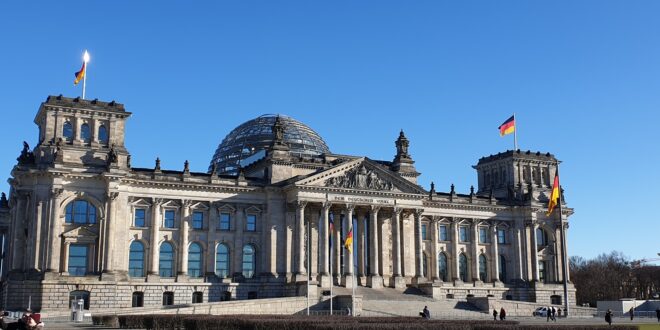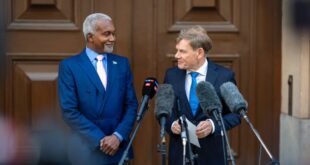Dr Pierrette Herzberger-Fofana, a member of the Green Party and former MEP, examines the ongoing political crisis in Germany, shedding light on the key issues at stake and the position of her party.
—
In a speech delivered on the evening of 6 November 2024, Chancellor Olaf Scholz announced the dissolution of the “tricolour” coalition—formed by the Social Democrats (SPD), the Greens (Bündnis 90/Die Grünen) and the FDP. The decision follows the dismissal of Finance Minister Christian Lindner, the FDP’s chairman, due to escalating tensions in the coalition. Scholz replaced Lindner with Jörg Kukies, a close advisor, marking a break with the FDP and initiating a shift in Germany’s political landscape.
Lindner’s removal has led all FDP ministers to resign, with the exception of Transport Minister Wissinger, who will assume the justice portfolio and has resigned from the party. In his speech, Scholz cited multiple instances where Lindner blocked agreed-upon decisions, contributing to a weakened coalition.

Scholz announced he would call for a vote of confidence on 15 January 2025, with the goal of holding early general elections by March 2025.
Opposition parties, however, are pushing for an earlier vote and possibly a January election. If the Bundestag is dissolved following a failed confidence vote, elections may occur on 25 March 2025, in accordance with Germany’s constitutional guidelines.
The Chancellor’s decision marks the end of the ‘tricolour majority – Die Ampel’, as it effectively places the Chancellor and his government in a minority in the Bundestag.
Deadlines for new elections under German Law
If the Chancellor loses the confidence vote, he must request that the President dissolve the Bundestag. Article 68 of the Basic Law allows the President a maximum of 21 days to decide, after which a new Bundestag must be elected within 60 days as per Article 39.
What is a Vote of Confidence?
Under Article 68 of the Basic Law, the Chancellor may ask the Bundestag to grant him a vote of confidence. He can – but does not have to – link it to a specific legislative project. In fact, this instrument is intended to help a Chancellor close ranks and consolidate his own power base. All members of the Bundestag have the right to vote, and as a rule, a governing coalition has a majority.
This mechanism is typically used to consolidate power, though its outcome may also lead to early elections, such as under the current political situation.
Key Points of Contention
At the heart of the dispute in the governing coalition is Scholz’s plan to increase spending for Ukrainian aid and a domestic support package focused on reducing energy prices and introducing investment incentives.
These initiatives would require loosening Germany’s strict adherence to the debt brake (Schuldenbremse), a constitutional limit on public borrowing.
Christian Lindner, adhering firmly to the debt brake, argues that this fiscal discipline is crucial to prevent burdening future generations with excessive debt. However, critics, including many in the Green Party, argue that the debt brake stifles essential investments in infrastructure and climate protection.
The cap restricts Germany’s capacity for impactful political action, according to the Greens.
The Green Party’s position
Vice-Chancellor Robert Habeck and Foreign Minister Annalena Baerbock have urged dialogue, emphasizing that the coalition’s dissolution was avoidable. In a recent statement, Habeck warned against political polarization and called for unity in navigating Germany’s challenges.
Habeck showed his discernment, referring to the elections in the United States, he said “We have seen what happens in the United States when hatred and persecution, when populism and division poison elections and political debates. Germany can do things differently, and Germany will do them better.”
German President Frank-Walter Steinmeier on Thursday called on the country’s political leaders to ‘reason’ and ‘responsibility’, adding that “Our country needs stable majorities and an effective government”.
President Steinmeier has also urged political leaders to prioritize stability and responsibility, emphasizing the need for effective governance during this critical period.
Germany stands at a crossroads, with the potential for early elections looming large. The unfolding crisis highlights deep divisions over fiscal policy and governance, underscoring the challenges of coalition politics in turbulent times.
 THE AFRICAN COURIER. Reporting Africa and its Diaspora! The African Courier is an international magazine published in Germany to report on Africa and the Diaspora African experience. The first issue of the bimonthly magazine appeared on the newsstands on 15 February 1998. The African Courier is a communication forum for European-African political, economic and cultural exchanges, and a voice for Africa in Europe.
THE AFRICAN COURIER. Reporting Africa and its Diaspora! The African Courier is an international magazine published in Germany to report on Africa and the Diaspora African experience. The first issue of the bimonthly magazine appeared on the newsstands on 15 February 1998. The African Courier is a communication forum for European-African political, economic and cultural exchanges, and a voice for Africa in Europe.




































